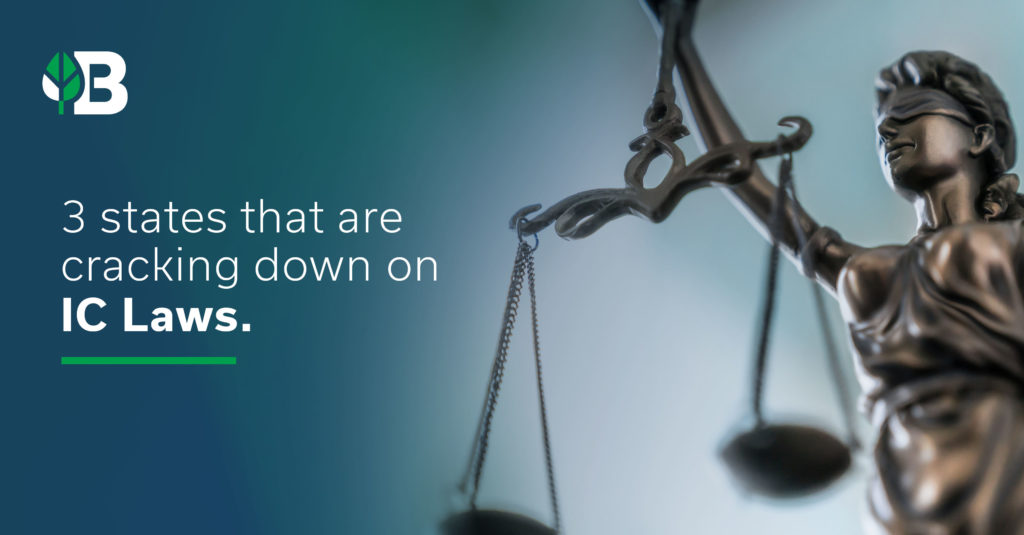
3 States That Are Cracking Down on IC Laws
At Broadleaf, we know how hard it can be for business owners, employers, and staffing agencies to manage their contingent workforce—especially in 2020. In this new decade, IC laws are making an impact in some of the nation’s most populous states. What’s more, the impact of these laws is being felt nationwide—for better or worse.
Let’s take a look at three states that are trending in IC law news.
California: New IC laws are complicated.
California’s Assembly Bill 5, otherwise known as AB5, is “straining the relationship between independent contractors and the companies that hire them.”
This, according to a conversation between Beverly Hallberg of the Independent Women’s Forum and Ellie Bufkin, a freelance writer and senior contributor to The Federalist, is already making a significant impact on the gig economy. Here are some key takeaways:
- AB5 took effect on January 1, 2020
- Stemmed from a case that “attempted to redefine an independent contractor” in California
- New rule: solo independent contractors who do not meet one of the few “professional” exceptions delineated in the statute must be classified as employees to perform their duties
- Redefines how much work a freelancer can do without having to be hired by their client
- “It’s taking away the freedom to work for millions of Californians who depend on having a stay at home schedule, a flexible part time schedule.”
- Offers benefits, such as paid leave and benefits, but eliminates freedom of flexibility
- Affects freelancers all over the country; California-based organizations have been forced to sever ties with freelancers from all over the United States
New York: ICs and freelancers have rights, too.
On the opposite coast, new IC laws seem to be having a more favorable impact on freelancers and independent contractors. Under the New York City Human Rights Law (NYCHRL), freelancers and ICs “now have the same protections against discrimination, harassment and retaliation.”
According to these insights by Bloomberg Law, here’s what’s happening:
- Freelancers and ICs are now protected from discrimination and harassment in the workplace, can file complaints with the NYC Commission on Human Rights
- Freelancers and ICs “have the right to receive reasonable accommodations for needs related to disabilities, pregnancy, lactation, religious observances, and status as victims of domestic violence, sexual offenses, or stalking”
- Hiring entities can no longer ask about an applicant’s criminal record before making a job offer, whether it’s in ads, applications, or during job interviews
- Hiring entities are prohibited from obtaining information about an applicant’s salary and/or credit history
- Contractors must complete annual sexual harassment prevention training if their employer has 15 or more workers, among other factors
New Jersey: Walking a fine line between New York and California.
Across the river in New Jersey, Governor Phil Murphy signed some employee misclassification legislature that aims to “protect employees who are misclassified as independent contractors” and ICs who are “improperly treated as employees. While this is good news for workers, some business leaders claim it will raise their costs.
According to this business news article published by nj.com, the new laws will have the following effects:
New Jersey employers will be:
- Penalized for intentionally misclassifying employees
- Required to post notices describing misclassification
- Subject to stop-work orders who violate wage, benefit, or tax law
- The State Department of Treasury can no longer share tax info with Labor and Workforce Development
- Contractors and employers are now equally liable for evading tax laws
- The legislature is designed to keep “unscrupulous contractors” from “cheating their workers out of hard-earned wages and benefits in order to undercut the competition and increase personal profits”
- Does not redefine employees and ICs like California does, due to an outcry from New Jerseyan freelancers, though this bill could still be passed
For more total talent insights, check out our Resources Page.
And don’t forget to follow Broadleaf on Twitter, LinkedIn, Facebook, and Instagram!




